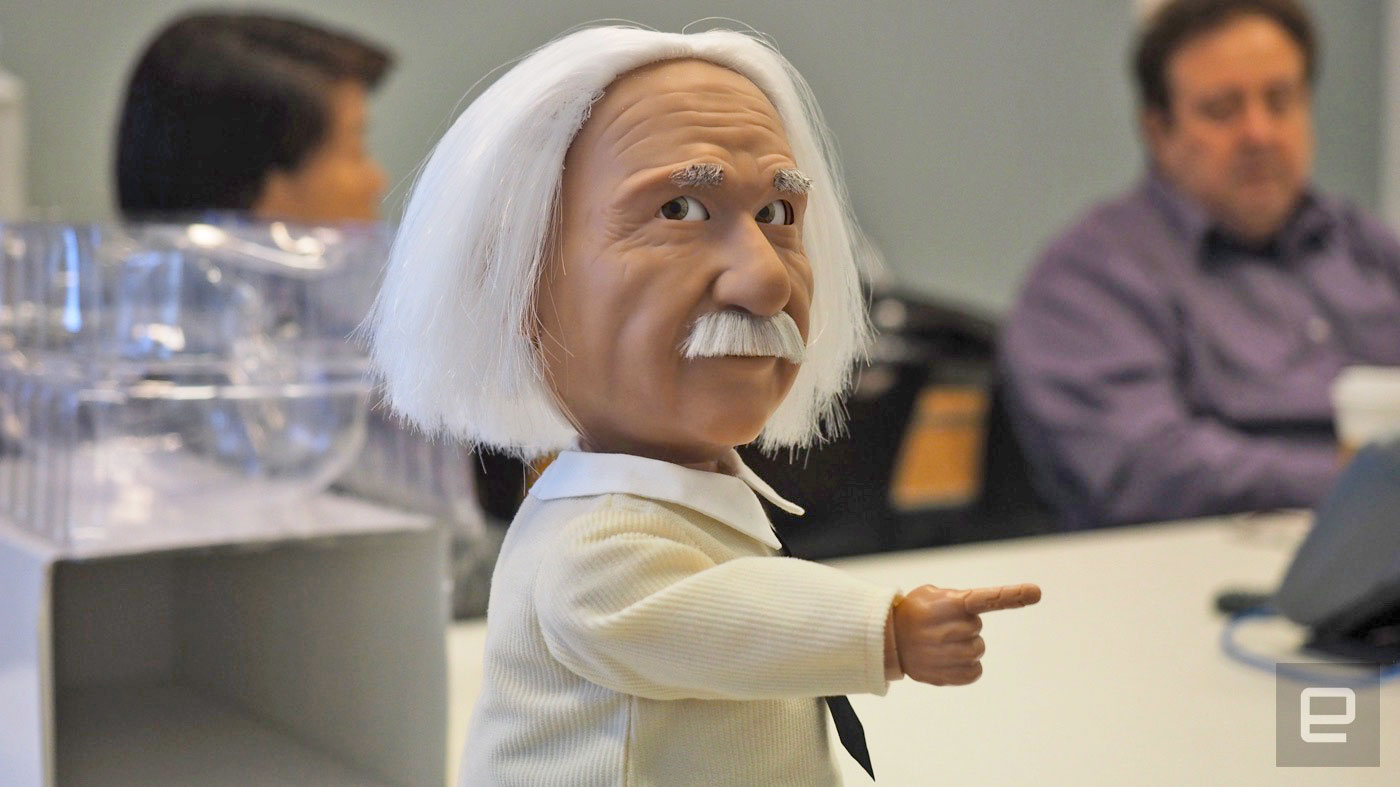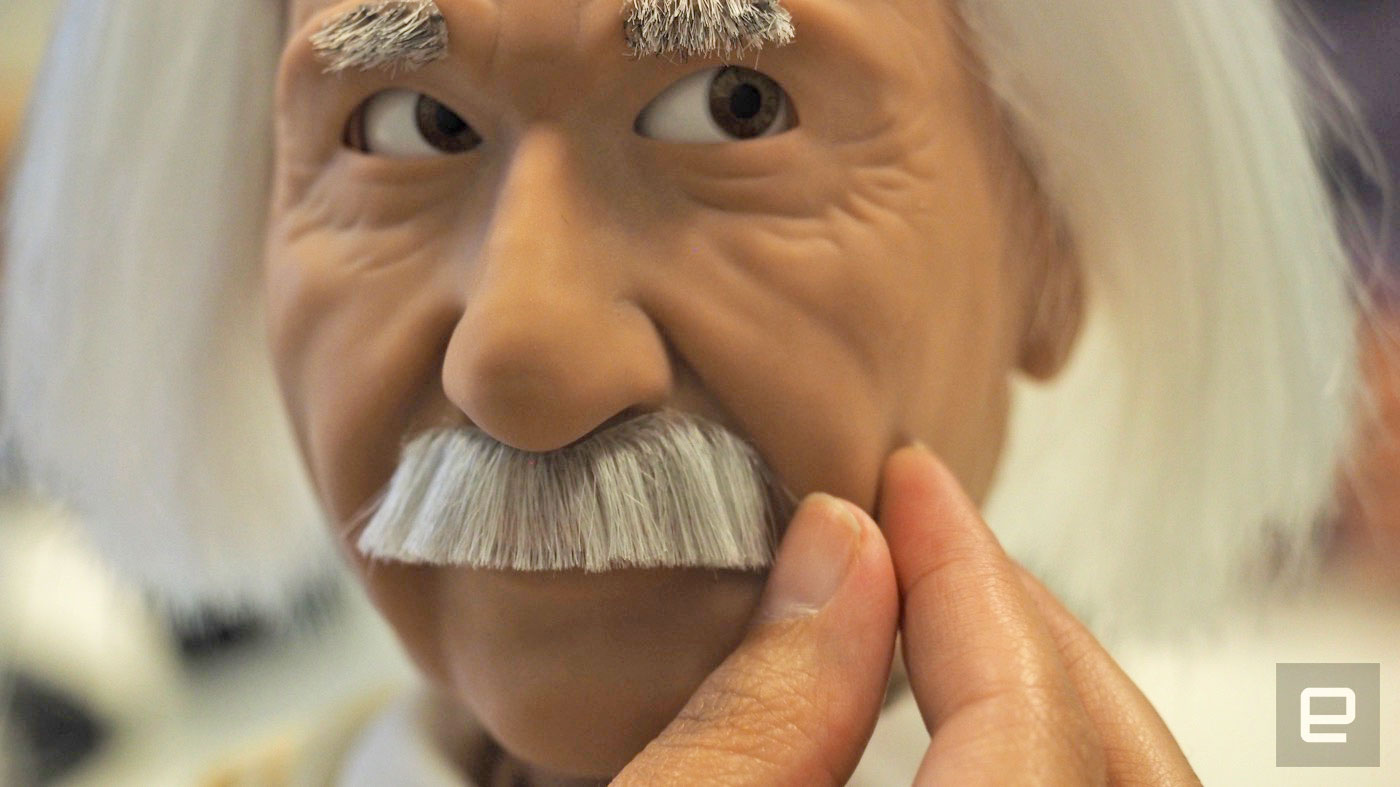Einstein robot's facial expressions and smarts
Chris Velazco, Engadget
The mechanical professor from Hanson Robotics is designed to be your favorite teacher, loaded with tons of knowledge, funny anecdotes and exaggerated expressions.
At a time when digital assistants like Amazon Alexa and Google Home are making voice-controlled human-machine interactions more common, a chatty "personal genius" for kids seems like a natural progression for mechanical toys.

(Photo credit: Chris Velazco, Engadget)
Einstein communicates in both online and offline modes. When it's connected to the cloud via WiFi, it uses natural language processing to keep the conversation going. Instead of building its own speech recognition technique, the company taps into open-sourced APIs, allowing the robot to do things like pull up weather updates or tell you about Donald Trump. But it seems to be most active in its offline mode, when it connects to an accompanying app called Stein-o-Matic that's designed to keep kids engaged through audio-visual activities.
The mechanical professor from Hanson Robotics is designed to be your favorite teacher, loaded with tons of knowledge, funny anecdotes and exaggerated expressions.
At a time when digital assistants like Amazon Alexa and Google Home are making voice-controlled human-machine interactions more common, a chatty "personal genius" for kids seems like a natural progression for mechanical toys.

(Photo credit: Chris Velazco, Engadget)
Einstein communicates in both online and offline modes. When it's connected to the cloud via WiFi, it uses natural language processing to keep the conversation going. Instead of building its own speech recognition technique, the company taps into open-sourced APIs, allowing the robot to do things like pull up weather updates or tell you about Donald Trump. But it seems to be most active in its offline mode, when it connects to an accompanying app called Stein-o-Matic that's designed to keep kids engaged through audio-visual activities.
The company, which has been around 2013, is known for building robots that have life-like expressions. Chatty Sophia made a splash at SXSW last year, while BINA48 was widely acclaimed as one of the most realistic robots. Then there was the lifesize Einstein, which had an uncanny resemblance to the man it emulated. Each machine came one step closer to replicating human facial expressions.
The machine picks up movements of the face right in front of it. This tracking, known as "blob detection" in computer vision, is different from facial recognition. It doesn't record or memorize faces. Instead, it can spot facial features to detect and keep up with movements to maintain eye contact through most conversations.
The robot entertains and educates, and has a price point just under Mattel's recently announced Aristotle -- a $300 connected speaker aimed at a young generation. It also undercuts Lego's Mindstorms collection, a range of robots starting from $350.
While Einstein is pegged as an affordable personal companion, it doesn't seem to have the output required to compete with the personal assistant speakers that have already found a spot on thousands of kitchen counters across the country.
The robot's speaker lacks the clarity of an Amazon Echo or Google Home. And as the machine moves its mouth and head to create the expressions that the company is famous for, a whirring sound makes its voice that much harder to pay attention to.
What's more, Einstein's ability to pull information from the web is a lot slower than say Alexa, for instance. It compensates for its pace with a polite teacher-like disposition: "Let me think about that for a moment."
In this article: culture, gear, HansonRobotics, PersonalAssistant, ProfessorEinstein, robots, science, Sophia
By Mona Lalwani @monalalwani
Source: https://www.engadget.com/2017/01/23/professor-einstein-robot/


No comments:
Post a Comment